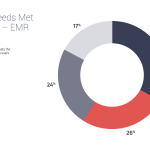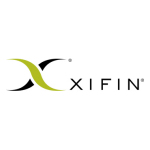Study Finds Over 70% of Adopters Judge Precision Medicine Informatics Initiatives as Nearing or Exceeding Expectations

New Research from XIFIN and Journal of Precision Medicine Yields Promising Findings on the Value of PMI Initiatives
SAN DIEGO–(BUSINESS WIRE)–With more healthcare systems adopting and implementing precision medicine informatics (PMI) initiatives today, healthcare leaders are looking for insights around the emerging field to ensure they get the most value from their informatics investments from a diagnostic, clinical and financial data perspective. To help provide these insights, XIFIN and the Journal of Precision Medicine teamed up to explore the various factors that impact and support PMI program success. In the first report of a series from the global survey-based study, “The Value of Precision Medicine Informatics Initiatives,” XIFIN tested the hypothesis that specific combinations of technology, data integration and approaches lead to better overall value of a PMI program.
Precision medicine programs have the potential to decrease adverse events and provide better outcomes at a lower cost by tailoring therapies based on individual patient characteristics, but without the proper technology, PMI value and program expectations are not being met. Electronic health records (EHRs) have been found to be ineffective in supporting precision medicine at the point of care. According to the study, nearly 60% of survey respondents indicated their enterprise system, such as EHRs, did not meet or only partially met their needs as a precision medicine user.
“The fundamental design of EHRs makes them unsuitable for precision medicine programs because detailed patient data, such as biomarkers, are locked within a PDF,” explained Nigel Russell, editor-in-chief of the Journal of Precision Medicine. “Physicians need real-time access to the patient data that will enable them to make the best patient care decisions, and today, investors and providers alike are looking for technologies that provide comprehensive clinical, diagnostic and financial data to ensure and build successful PMI programs.”
Study research revealed that providers more frequently adopt and use PMI technologies that include provider-facing clinical analytics solutions, real-world data aggregation technology, business intelligence tools and clinical data warehouse solutions. Furthermore, the research indicates that the next wave of PMI technology expected to be adopted includes care team collaboration, tools to refer patients to certified genetic counselors, biomedical analytics solutions and quality reporting capabilities.
“While precision medicine is becoming more mainstream, it is still a nascent discipline. Sharing the details of initiatives across the healthcare community will serve to accelerate adoption and determine future best practices so that we can truly harness precision medicine informatics for better outcomes,” said Lâle White, CEO, XIFIN. “For instance, the survey results demonstrate early adopters are already thinking about how high quality real-world data will support and potentially accelerate clinical utility evidence development, coverage decision making, claims adjudication, expansion of drug indications, and regulatory submissions. Powerful information like this is essential to reducing the cost of healthcare and improving patient outcomes. It is imperative that organizations have a real-world data strategy both from a real-time access standpoint as well as from an actionable analytical insights perspective.”
Of those who have implemented PMI technologies, nearly three-quarters indicated that their initiative neared, met or exceeded their expected value as compared to other technology investments. Finance, revenue, accounting and billing executives are leading the planning of PMI initiatives, demonstrating a shift and awareness in the finance and revenue function of PMI value.
Additional key findings from the study include:
- Real-world data is currently used for disease insights, cohort studies, peer-reviewed publications and clinical trial matching. Within three to five years, it will be used for coverage decision making, drug safety and efficacy, clinical utility evidence development, regulatory submissions, expansion of drug indications and claims adjudication.
- Future data accessibility trends include device and/or sensor data, patient-reported outcomes, financial data, claims and reimbursement data, and pharmacy data.
- The greatest positive impact of PMI initiatives is on physician and care team metrics and use and accessibility of real-world data metrics.
More information about this study can be found in “The Value of Precision Medicine Informatics Initiatives Report,” which can be downloaded at www.visualstrata.com. Precision medicine users and decision makers are invited to add their voice to this ongoing study by visiting www.visualstrata.com/pmisurvey.
To learn more about how precision medicine informatics data can positively augment the functionality of enterprise EHRs, register for the upcoming webinar, “How Data Science Makes Your EHR Smarter and Accelerates Your Precision Medicine Programs.” XIFIN is committed to helping diagnostic providers maximize the value of their clinical, diagnostic and financial data, driving better business and patient outcomes. The company’s solutions include VisualStrata, a precision medicine informatics platform that uniquely aggregates and curates clinical, financial and diagnostic data, enabling healthcare professionals to gain insight, make decisions, and improve care and outcomes.
About XIFIN, Inc.
XIFIN is a healthcare information technology company that leverages diagnostic information to improve the quality and economics of healthcare. The company’s cloud-based technology facilitates connectivity and workflow automation for accessing and sharing clinical and financial diagnostic data, linking healthcare stakeholders in the delivery and reimbursement of care. To learn more, visit www.XIFIN.com, follow XIFIN on Twitter and LinkedIn, or subscribe to the XIFIN blog.
Contacts
Julie Sculley, 617.986.5730
xifin@fleishman.com


